As she made her way through the Los Angeles Chargers’ training camp, Liliana T. Pérez smiled at and conversed in both English and Spanish with coworkers she was familiar with, as well as volunteers and fans she was meeting for the first time. All of her interactions had one thing in common that reflected her role as the Chargers’ Senior Director of Cultural Affairs — making sure everyone knew they were welcome regardless of their roles.
“The essence of what I do is connecting my organization, among all of our divisions, and my Bolt family to the community,” Pérez said.
Growing up in Pico-Union
Before she became the first person to fill this newly created leadership role, Pérez had a few obstacles to overcome. Pérez was born in Guadalajara, Mexico, and at the age of two immigrated to the United States with her mother. She grew up in Pico-Union, located west of downtown Los Angeles.
“I grew up in an area where the demographics were changing,” Pérez told CALÓ NEWS. “In the mid-80s, that’s when you had a large group of immigrants from Central America come, because of all the war-torn countries and civil war that was taking place there. The same with Cuban Americans. There was a massive exodus from Cuba. There was a very big international Latino space [in Pico-Union].”
Undocumented until she was 18, Pérez said that she felt a looming fear of deportation, especially throughout her time in elementary school. “There would be immigration vans and sweeps,” she said. “You hear about that now, but that especially happened back then. At the time it was INS [Immigration and Naturalization Service] or la migra, which is the same now. That was always a part of my traumatic experience growing up.”
Flourishing regardless of environment
The oldest of three sisters growing up in a dangerous neighborhood, Pérez was raised by her single mother who, despite struggling financially, always managed to not only provide necessities but also be there when they woke up and when they went to sleep, regardless of her job.
“I had a very challenging upbringing, but I also had the honor of having an incredible mother who was very resilient and always had faith in me,” Pérez said. “She’s the reason why I have this incredible tenacity and the audacity to be able to say that I get to live beyond my circumstance, live beyond the pain that I grew up with, but live within the potential that she always saw in me.”
Because she lacked a Social Security number, Pérez was unable to work, but her mother never allowed her to stay home during her time off from school. Volunteering as a tutor and at elementary schools led her to an internship for Assembly Majority Leader Mike Roos in the 1980s.
“I was the only one who spoke Spanish and I was the only one who had working knowledge about immigration reform,” Pérez said. “When we had questions in Spanish and about immigration, I was fully versed because I was going through that process myself. Honestly, the whole time, I thought, ‘Anybody can do this.’ And we can. Anybody can be of service.”
It wasn’t only her own immigration experience that inspired Pérez to venture into government spaces, but her mother’s service to others, especially to the tenants in the apartment she managed and lived in. Despite not being fluent in English or having any legal experience, her mother became the problem solver for friends and neighbors who faced domestic violence cases or immigration problems.
“She’s my example,” Pérez said. “Everyone has the opportunity or the chance to help someone. You just have to be willing to do that. She’s my first example of being fearless and that fearlessness is translated to me. If my mom can do it coming to the United States with me, I sure as hell better be able to use that superpower to help me navigate different areas.”
Always making a difference
Not knowing quite what she wanted her career path to be, as all she knew were doctors, attorneys and teachers, Pérez attended California State University, Northridge intending to become a teacher. Throwing herself into activism, she became involved with campus clubs, such as Movimiento Estudiantil Chicano/a de Aztlán, or M.E.Ch.A., a community of Latinx/Chicanx students aiming for an education based on cultural and political consciousness; Strong Queers United in Stopping Heterosexism, or SQUISH; and Students Against Apartheid in South Africa.
In addition to involvement in her college community, during her freshman year, Pérez worked as a live-in housekeeper and nanny to two children, and she realized she was being exploited by working for low wages. It wasn’t until other housekeepers she took the bus with told her she deserved better pay that she quit a year after she started.
“I’m not embarrassed, I’m very proud to say what I’ve done in the past because that’s how I built who I am now,” Pérez said. “That’s why I appreciate everything that I have because I’ve been through a long journey.”
Working in California government
Pérez’s career in government service consisted of serving six Speakers of the Assembly and Governor Gray Davis among her various leadership roles, which included serving as the Southern California Deputy Director for the Speaker’s Office of Toni G. Atkins and Anthony Rendon from 2014 to 2017, the Senior Outreach Consultant for the Assembly Democratic Office of Communications and Outreach from 2017 to 2018 and the Deputy Director for the Speaker’s Office of Protocol from 2018 to 2019.
The first-ever, Latina Senior Director of Cultural Affairs
In July 2019, Pérez was approached for the first LA Chargers’ Senior Director of Cultural Affairs position. That happened four seasons ago. What she lacked in knowledge about football and sports, she made up for in her understanding of LA’s cultural landscape and her ability to network with leaders among multiple industries due to her years in politics. Since then, she has not only reached Spanish speakers but has had the opportunity to amplify the voice and presence of Latinos by creating media partnerships, such as with Estrella Media, a Spanish-language media company, and La Que Buena, a radio station that airs all LA Chargers’ home and away games.
“I’m proud to be able to say that this is how I leave our mark,” Pérez said. “Now, the largest concentration of Latinos in LA are young Gen Zers [who] are consuming information biculturally and bilingually. They want to see themselves reflected. They might not speak the language, or may speak a little bit more English than Spanish, but still want to see themselves reflected. I’m honored to have the platform to be able to amplify that voice within our organization.”

Bolt Pride Worldwide tailgating at Thunder Alley, Riverside, CA. Photo Courtesy of Liliana T. Pérez.
As the Senior Director of Cultural Affairs for a National Football League team with such a large Latino fanbase, Pérez’s main priority is how the Latino community can see themselves authentically reflected in the LA Chargers.
“I’m very proud that our rally cry is not only ‘Bolt Up,’ but also ‘Puro Chargers,’” Pérez said. “Puro Chargers speaks to that bilingualism, speaks to the parts of us that make us uniquely from this country. We’re also proud to be able to have Latinos as our fanbase. My role, at the end of the day, is helping to connect us to all parts of this amazing county, city and Southern California community.”
CALÓ NEWS sat down with Pérez to discuss her role with the LA Chargers, working in a male-dominated field, being a member of the LGBTQ+ community and representing Latinas like herself.
Responses have been edited for clarity and brevity.

LA Chargers
LILIANA T. PÉREZ-PALACIOS, 53, ATWATER VILLAGE, LOS ANGELES, SENIOR DIRECTOR OF CULTURAL AFFAIRS FOR THE LOS ANGELES CHARGERS, SHE/HER/ELLA/PODEROSA, LATINA
WHAT DIRECTION HAVE YOU TAKEN THIS POSITION SINCE YOU TOOK ON THE ROLE?
Number one, it’s having the honor of being entrusted to be an ambassador in English and Spanish and having the honor of being able to say how I think Latinos need to be reflected in our community, in our song lists, etc. Not only Latino heritage but how we get to express ourselves, season-wide. What does that mean? The first year that I was here – I am always learning, I feel like every day is my first day – but I just put my head down and tried to figure out how to add value. It turns out that you don’t understand the impact until other people reflect on it. I feel so honored. The Spanish language is part of it. The bilingualism and biculturalism from shifting from Hispanic heritage to Latino heritage and being the first club to embrace Latino heritage. Latino heritage speaks to the geography, and the common language, and it also is inclusive of our Portuguese fans, it’s inclusive to our Indigenous fans, it’s inclusive. Hispanic is very centered around origins from Spain and many of our origins started from there, but many of our origins also started from here. How you create a board that encapsulates everything, for me, was Latino. That’s what I said and I had the trust of my organization to help shift us from Hispanic to Latino.
In LA, when we had the Super Bowl, there was a big ceremony. I was invited to that ceremony, and it was called MVPs and I was selected as one of three women across the league to be recognized for our role. I was recognized by the Leaguefor my work and for helping to move the needle to be reflective of the Latino community. I was just beyond myself, I was absolutely beyond myself and honored for that. And I have subsequently received several other recognitions. You take it for granted. You’re just trying to do a job, not just a job, you try to do your best, but you’re not understanding that, when you’re the first, it feels self-aggrandizing. That’s why I don’t say I’m a trailblazer, I don’t use that word for myself, but it’s a description that is used for me. When I am invited to [participate in] panels, because it’s a male-dominated space and because people from where I come from don’t understand that this is even a possibility, a remarkable opportunity, let alone a career choice, that’s why I hold it with great, high regard to be a part of this organization and to represent myself authentically. I don’t know how to do it any other way. I am a Latina, an immigrant and now a U.S. citizen, very proud to be. What you see is what you get and I’m very proud to represent the communities and the people who I left behind and I bring with me. When I speak to young people, and I speak to people across the spectrum, I always say, ‘Turn around, turn right and to your left, that could be your future doctor, your future nurse, your future boss,’ but it’s up to you to see the humanity in everybody because everybody has worth. Everybody has worth, from the one picking up trash to the one who’s signing the paychecks. That’s the value system that I want to encourage and encourage a culture of belonging. I’m so proud to be part of this organization because this organization affords me the platform to be able to impact that statement in a significant way. For the first time in the history of our organization, we participated in the Long Beach Pride. Why is that important? It’s important because if you can see it, you can be it. If other people don’t see themselves reflected in everything that we’re doing here, then we’re missing the opportunity. As a woman of color who grew up in a certain area with certain struggles, I can do it, but you can do it, too.
YOU ARE WORKING IN A PREDOMINANTLY MALE FIELD. AS A LATINA, WHAT HAS THAT BEEN LIKE?
Across the board, even in politics, as you get higher up the chain, you are still in different leadership roles. You can assume different leadership roles, but it’s still unfortunately very male-dominated. I take it upon myself to build relationships, and building relationships is building trust. Quite frankly, I think a lack of understanding for many young women is that they don’t think they can have a place at the table. We need to assert our space at the table. And, again, that’s the fearlessness that I get from my mother. I still have my insecurities. I still have my impostor syndrome but then I remember I can do this. My mom did this. My mom did the hard stuff, now I can do this.

LA Chargers proudly participated in the 40th Annual Long Beach Pride Parade. Photo Courtesy of Liliana T. Pérez.
I READ THAT THE LGBTQ+ COMMUNITY WILL CONTINUE TO BE A KEY FOCAL POINT FOR THE ORGANIZATION GOING FORWARD. HOW DO YOU PLAN TO DO THIS?
Pride is predominantly celebrated in June, but I, on purpose, identified opportunities for us, not just one event in June, but events in the LGBTQ+ community throughout the year. In June we sponsored Latino Equality Alliance (LEA)’s Annual Purple Lilly Awards. In July, we were thrilled to partner with South LA Pride. It’s a free event that takes place in the heart of South LA, and it’s a beautiful community of families of all shapes, sizes, colors and backgrounds. It’s creating a safe space for all families where even heterosexual families bring in their kids because that’s what it should be. In August, we were the first team to ever participate in the Long Beach Annual Pride Parade with our LGBTQ+ fans and staff. In October, we were proud sponsors of Equality California’s (EQCA)’s annual LA Awards Dinner. Pride should be a place for everyone all year round.
YOU ARE A BOARD MEMBER OF THE COALITION FOR HUMANE IMMIGRANT RIGHTS (CHIRLA). CAN YOU TALK ABOUT THE ORGANIZATION AND WHAT YOUR ROLE IS?
I am a board member of CHIRLA, which is the Coalition for Humane Immigrant Rights of Los Angeles. I’m the first board member ever to represent, at the time, an elected office. I continue to serve on the board because not only are they doing amazing, humanitarian work for families who are arriving, families who have been here and who don’t have legal documents or status, but are trying to achieve it. They also create a leadership program for young students in college and advise parents and their families on how to be able to live and thrive in Los Angeles. It’s a space where it’s an education awareness, it’s an entry point where everyone is welcomed and everybody learns how to acculturate in a safe space. Like, ‘You have to learn the language, this is where you go, when you’re stopped by any law enforcement official, let’s be respectful always.’ It helps inform the person of their rights, opportunities and responsibilities.
YOU HAVE BEEN RECOGNIZED FOR YOUR ADVOCACY WORK ON BEHALF OF MARGINALIZED POPULATIONS INCLUDING THE LGBTQ COMMUNITY, IMMIGRANTS AND WOMEN AND YOU REMAIN PASSIONATE ABOUT SOCIAL JUSTICE AND CIVIL RIGHTS CAUSES AND ARE ACTIVE WITH NUMEROUS ORGANIZATIONS. CAN YOU TALK ABOUT YOUR ADVOCACY AND VOLUNTEER WORK?
In addition to CHIRLA, I am also a board member of Equality California, which is a statewide LGBTQ+ advocacy organization that helps advise legislators and members of the community about how to best create laws that reflect and protect our LGBTQ+ communities. I’m also a board member of LEA, the Latino Equality Alliance, a Latino LGBTQ+ organization based out of Boyle Heights, which is now in Southeast LA, but we do have a regional impact. The same thing goes for Bienestar, an LGBTQ+, Latino, immigrant community-focused mental health organization that was pioneered during the AIDS epidemic. You had non-Latino organizations receiving millions of dollars, but yet, it never really came down to Latino organizations and heavily impacted Latino/a communities. Bienestar was created so that we could be able to then provide equitable access to health care and information to the Latino LGBTQ+ community and their families.
We’re still fighting and we’re thriving. I’m also a board member of Conga Kids, which is an education program through dance. It teaches children about the origins of cumbia, merengue, salsa, ballroom dancing and the cultural connections of hip hop. Then, at the end of the curriculum, the kids understand that they have more in common than they have separations. [For example,] the African rhythms of these Latino dances should be uniting us. That’s why education is the greatest equalizer.
I READ THAT YOU ARE AN OPENLY BISEXUAL MEMBER OF THE LGBTQ+ COMMUNITY AND THAT COMING OUT WASN’T THE EASIEST FOR YOU. CAN YOU TALK ABOUT WHAT THAT WAS LIKE?
Any normal person would either shut up or just tell a select few. I don’t fall into that. I was on the Christina show, which was, at the time, Oprah at the international level. She’s no longer on air, but I was on the Christina show and was invited to talk about the segment on young LGBTQ+ youth at the time. It was just lesbian and gay youth because the other letters didn’t exist. I did come out as lesbian [at the time.] My mom had a really difficult time with it. My ride-or-die had a really difficult time. We didn’t talk to each other for a long time and that was hard. Real hard. But that’s the thing, we have to be very careful about how calculated we come out. Not everybody has the ability to be safe when they come out. It’s a very personal choice and it has to be very well thought out.
LAST MONTH, YOU WERE HONORED AS AN AWARD RECIPIENT AT THE 5TH ANNUAL SOUTH LOS ANGELES PRIDE CELEBRATION FOR YOUR COMMITMENT AND DEDICATION TO YOUR COMMUNITY. WHAT AWARD DID YOU RECEIVE AND WHAT DOES IT MEAN TO YOU TO BE RECOGNIZED?
I was one of three recipients and I was recognized for my activism throughout the years. I’ve been an active member of the LGBTQ+ community since my early twenties so I’ve been doing cross-cultural work, intentionally building bridges of understanding and I’ve been engaged with pushing towards, not only marriage equality, but pushing forward access to health care for our trans men and women and also representation against police brutality, or against biases that exist within different levels of government. I’m proud to be able to be a part of that voice, working within the system, just to hold these agencies accountable in a public forum. It was fucking beautiful. I’m a disrupter. I’ve always been a disrupter, but always to level the playing field.
As for the award, [I’m] honored, absolutely honored. Especially since LA is going through so many changes and it’s a big recognition. There’s no civil rights without the African American community. There are no Latino rights without understanding that the African-American community has so many valuable lessons that continue to be learned. Latinos might have the numbers but the ones who we need to be listening to and looking at is the African-American community, and how they’ve grown. Even though we’re growing in numbers, the African-American communities have built the country. I’m proud that in the shift of South LA increasingly being Latino, I was recognized in that space. We need to work together, we’re stronger in numbers. We should never look at each other as adversaries, but rather as coalition partners. That’s what it takes for us to be able to lift our voices together.
YOUR POSITION AS THE CULTURAL AFFAIRS DIRECTOR IS A HUGE REPRESENTATION OF THE LATINO/A COMMUNITY. HOW DOES IT FEEL TO BE REPRESENTING YOUNG LATINAS, AND WHAT DOES THAT MEAN TO YOU?
What makes this so incredible as a city, as a region and as a county, is that we’re so diverse, and what makes us thrive is the uniqueness that everyone brings to the table. And then I get to represent all of the unique aspects of our incredible community and bring them to the table. I also helped identify, two years in a row, our fellows through the Donald H. Yee Fellowship, which is an AAPI fellowship specifically focused on football operations, and that in itself is to create space and impact the lives of those who we can help and support. I am Latina. I am LA and that responsibility is making sure that all of our diversity here is represented, including our Caucasian men, friends and fan members. Everybody around the table has to feel welcomed in everything and I get to be able to help set the table. How exciting! It’s not just for Latinos, but because I am uniquely who I am, I want to make sure that everybody feels connected. That’s what I bring to the table.

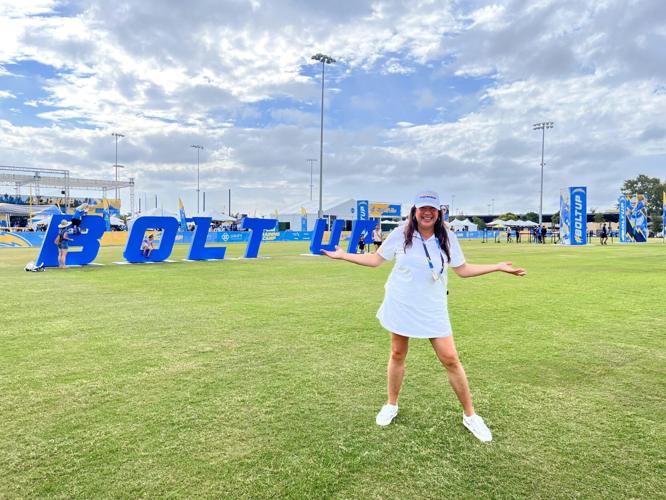

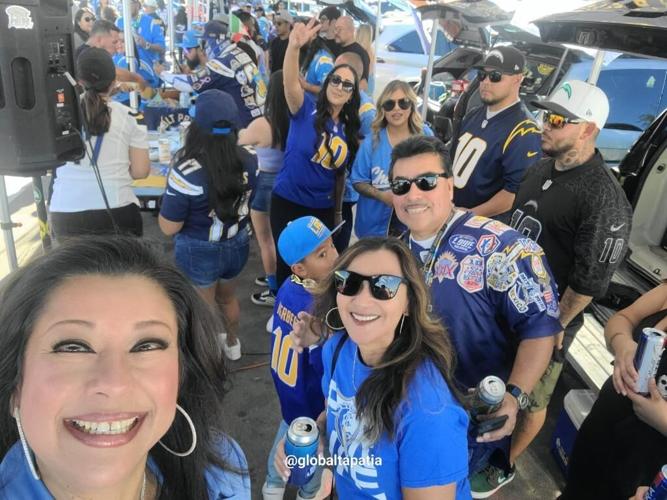

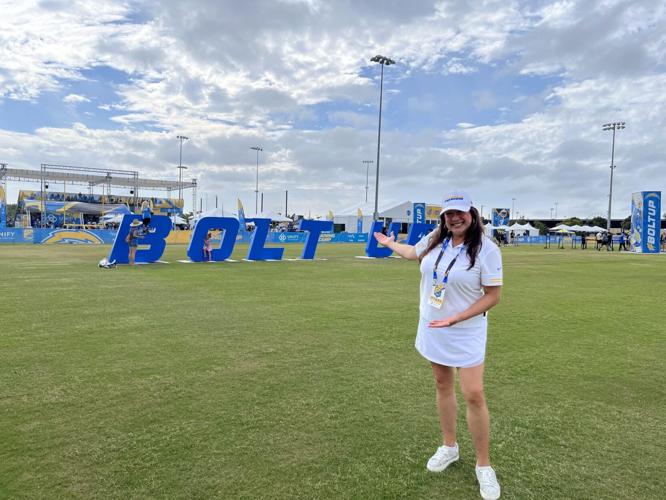

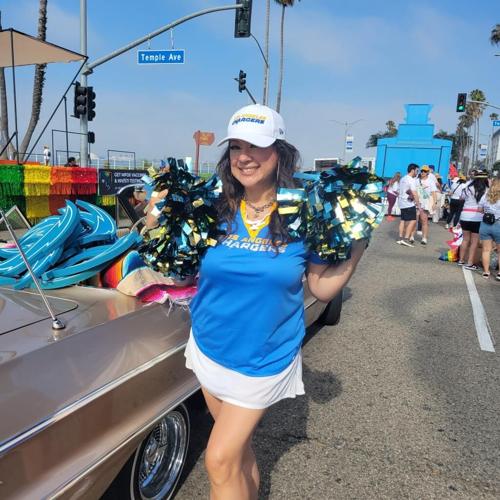
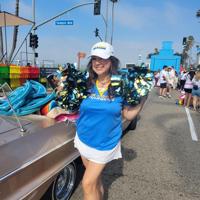








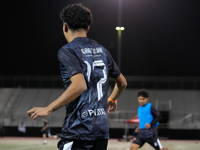
(0) comments
Welcome to the discussion.
Log In
Keep it Clean. Please avoid obscene, vulgar, lewd, racist or sexually-oriented language.
PLEASE TURN OFF YOUR CAPS LOCK.
Don't Threaten. Threats of harming another person will not be tolerated.
Be Truthful. Don't knowingly lie about anyone or anything.
Be Nice. No racism, sexism or any sort of -ism that is degrading to another person.
Be Proactive. Use the 'Report' link on each comment to let us know of abusive posts.
Share with Us. We'd love to hear eyewitness accounts, the history behind an article.